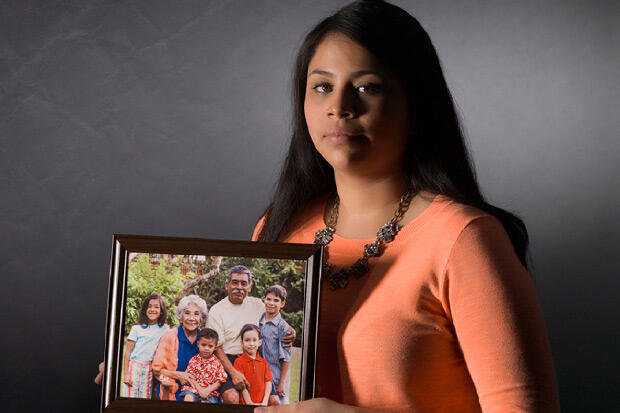
April 14, 2014
True detective: Vanessa Fuentes
Undergraduate explores importance of familismo for Latino college students
Share this story
In the beginning stages of her research career, Vanessa Fuentes has already found her passion. In a topic area that hits close to home, Fuentes is exploring cultural factors that play into mental health problems among college students.
“There has been a rise in mental health issues in college-aged Latinos in recent years,” said Fuentes, a senior psychology student in the College of Humanities and Sciences at Virginia Commonwealth University. “I wanted to explore whether cultural factors, such as ethnic identity and familismo, buffer the relationship between stress, discrimination and mental health outcomes in Latino college students. Familismo is the close bond between immediate and extended family members in the Latino community.”
Fuentes applied for and received a VCU Undergraduate Research Opportunities Program summer fellowship that allowed her to create her own research experience and project.
“UROP provided a great steppingstone for me and gave me amazing exposure to learning the process of research,” Fuentes said. “Through the UROP fellowship, I worked with my mentor, Dr. Rosalie Corona, and developed the research project on my own. It was very nice to have that flexibility. I was able to create my own research experience.”
For her research project, “How Does Culture Affect Latino College Students’ Mental Health?” Fuentes analyzed data collected from 198 Latino young adults who were recruited from two universities. These participants completed several questionnaires.
Seventy percent of participants reported minimal to mild symptoms of depression and 15 percent reported moderate to severe depressive symptoms. The results showed cultural factors were related to mental health outcomes and that close ties to family, or familismo, moderates the relationship between acculturative stress and mental health problems.
“I found that higher levels of familismo served as a protective factor against depression, anxiety and acculturative stress symptoms,” Fuentes said.
According to Fuentes, the findings highlight the importance of helping Latino college students remain connected to their families as a way of promoting mental health. The implications of these findings can inform the development of more culturally competent prevention programs.
Fuentes will present her work at the upcoming Society for Prevention Research annual conference in Washington, D.C.
“I really have enjoyed working with Vanessa. One of the parts of my job that I enjoy most is working with undergraduate and graduate students doing research,” said Corona, who is an associate professor of psychology. “UROP is a great opportunity for undergraduate students like Vanessa because it helps with their career development. The fellowship gave me the chance to get to know Vanessa better and to help mentor her in the early stages of her research career.”
The next step for Fuentes is a doctoral program and continuing on her research career path. She is interested in a graduate degree in clinical psychology in which she hopes to obtain more research and clinical training focused on working with Latino adolescents and other minority adolescents.
“There are very competitive graduate programs out there,” Fuentes said. “And that’s what I’m working on – making myself competitive.”
Subscribe for free to the weekly VCU News email newsletter at http://newsletter.news.vcu.
Subscribe to VCU News
Subscribe to VCU News at newsletter.vcu.edu and receive a selection of stories, videos, photos, news clips and event listings in your inbox.










